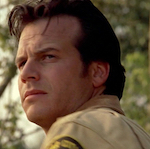 ONE FALSE MOVE was the Summer of ’92’s little crime movie that could. Like POISON IVY’s Katt Shea, director Carl Franklin was an actor turned director of Roger Corman productions (NOWHERE TO RUN, EYE OF THE EAGLE 2: INSIDE THE ENEMY, FULL FATHOM FIVE). Here he moved into the film festival/arthouse side of the indie world, having come across a hot screenplay from the new writing team of Billy Bob Thornton (an actor who had been in HUNTER’S BLOOD, GOING OVERBOARD, CHOPPER CHICKS IN ZOMBIETOWN, an episode of Knots Landing, etc.) & Tom Epperson.
ONE FALSE MOVE was the Summer of ’92’s little crime movie that could. Like POISON IVY’s Katt Shea, director Carl Franklin was an actor turned director of Roger Corman productions (NOWHERE TO RUN, EYE OF THE EAGLE 2: INSIDE THE ENEMY, FULL FATHOM FIVE). Here he moved into the film festival/arthouse side of the indie world, having come across a hot screenplay from the new writing team of Billy Bob Thornton (an actor who had been in HUNTER’S BLOOD, GOING OVERBOARD, CHOPPER CHICKS IN ZOMBIETOWN, an episode of Knots Landing, etc.) & Tom Epperson.
 Thornton told Entertainment Weekly at the time that they’d been trying to get it made for five years. He said the studios “all pounced on it” but then decided they couldn’t make it because “it didn’t have a rocket launcher or an oversized baby.*” Instead it was produced independently through I.R.S. Media (hip record label and makers of Cynthia Rothrock’s RAGE AND HONOR I & II), completing it in May of ’91. It sat on a shelf for a year except for playing some film festivals, where it was well received enough that the producer convinced I.R.S. to release it in a few cities on May 8, 1992, ostensibly to get review quotes for the VHS cover. It did better than they expected, though, and eventually expanded to 51 markets.
Thornton told Entertainment Weekly at the time that they’d been trying to get it made for five years. He said the studios “all pounced on it” but then decided they couldn’t make it because “it didn’t have a rocket launcher or an oversized baby.*” Instead it was produced independently through I.R.S. Media (hip record label and makers of Cynthia Rothrock’s RAGE AND HONOR I & II), completing it in May of ’91. It sat on a shelf for a year except for playing some film festivals, where it was well received enough that the producer convinced I.R.S. to release it in a few cities on May 8, 1992, ostensibly to get review quotes for the VHS cover. It did better than they expected, though, and eventually expanded to 51 markets.
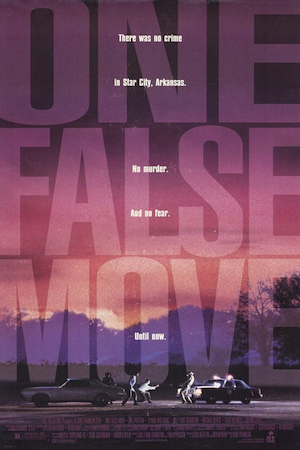 Thornton, sporting a very long ponytail and dangly earring, plays the unhinged villain Ray Malcolm. With the help of his buddy from San Quentin, a prolific stabber named Pluto (Michael Beach, THE ABYSS), and his reluctantly-participating girlfriend Fantasia (Cynda Williams, MO’ BETTER BLUES), he commits a sadistic home invasion. The goal is to steal a stash of cash and coke, which they do, but they also kill a bunch of people in the process.
Thornton, sporting a very long ponytail and dangly earring, plays the unhinged villain Ray Malcolm. With the help of his buddy from San Quentin, a prolific stabber named Pluto (Michael Beach, THE ABYSS), and his reluctantly-participating girlfriend Fantasia (Cynda Williams, MO’ BETTER BLUES), he commits a sadistic home invasion. The goal is to steal a stash of cash and coke, which they do, but they also kill a bunch of people in the process.
The next day LAPD detectives McFeely (Earl Billings, BUSTIN’ LOOSE) and Cole (Jim Metzler, 976-EVIL) investigate the crime scene and figure out not only the identity of the killers but that they might be headed for Star City, Arkansas, where Ray has some family. So they call the chief of police over there, Dale “Hurricane” Dixon (Bill Paxton between THE DARK BACKWARD and THE VAGRANT) to warn him.
Hurricane is another one of the great Paxton characters. In one of his first scenes he gets laughs from offscreen, over a speakerphone, just by how much he exhausts the LAPD police chief (John Mahon, SOMEONE’S WATCHING ME!, THE PEOPLE UNDER THE STAIRS) by fanboying out on him and then interrupting him to make small talk about his small town.
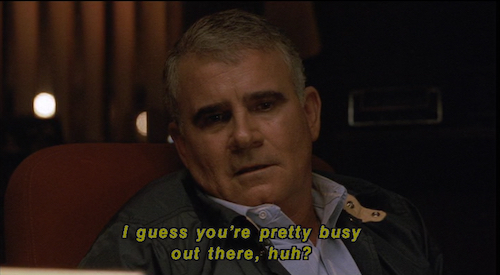
This is the LAPD and we’re watching it right after Rodney King, but still, everybody on the call is surprised to hear Hurricane say “Sometimes we get a stabbing. Colored boys, generally.”
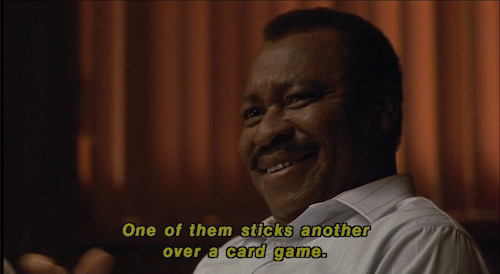
Hurricane acts almost like a wannabe movie star who thinks he might be on the verge of his big break, telling people “This could be a big one,” shushing his wife (Natalie Canerday, later in SLING BLADE) while he’s on the phone, saying, “It’s L.A., Cheryl Ann. Chief Jenkins and them,” and yelping with excitement after he hangs up.
McFeely and Cole end up having to come to Star City, and as grim as the movie is there’s humor in Hurricane’s excitement for the investigation, his eagerness to impress the out of town guests, and their reactions to his personality and different ideas of how to do police work. When they drive into town he spots them and introduces himself while driving beside them at high speed going the wrong way on a bridge, zipping off just in time to avoid colliding head-on with a semi.
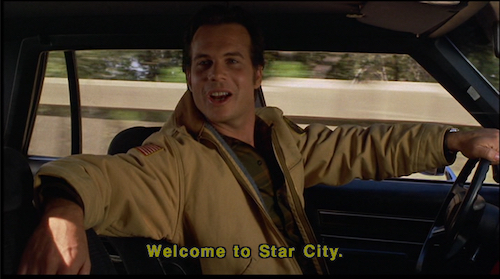
I love their combination of fear and amusement at his different ways of doing things. Is he really like this because things are different in a small town, or is he just a weirdo? Later it gets A-SIMPLE-PLAN-level uncomfortable in a scene when he overhears them making fun of his dream to move to L.A. because “I’d kinda like to take a crack at the big time.”
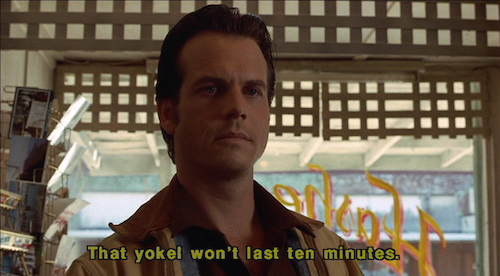
When they realize he overheard them, McFeely tries to face it head on. “Listen Dale, we didn’t mean—“ but then Hurricane gets a call on his radio, changes the subject and pretends to forget all about it.
Their whirlwind tour of Star City includes a trip to a diner to start eating breakfast, then underpay and zip off to a domestic violence call where Hurricane stops a drunk guy from attacking his wife with an ax, but lets him go and tells McFeely and Cole, “It’s okay, boys. Hell, I’m out here twice a week.” There’s an equally funny but less horrifying visit to Ray’s recluse uncle, who’s hard of hearing and impossible to communicate with. When he introduces himself as Chief Dixon the man says, “I’m fixing to do what?” When he asks if he’s heard from his nephew Ray Malcolm he says, “Ray Malcolm, that’s my brother’s boy. I reckon I heard of my own kin.”
During a dinner with the family and guests, Hurricane casually drops the n-word, to the horror of his wife. She later apologizes on his behalf and says “He didn’t mean anything by it, he just grew up talkin that way.” And she doesn’t say it to McFeely, who’s Black, she only says it to Cole, the white one!
Meanwhile Ray, Pluto and Fantasia make their tense road trip across the country, repeatedly thinking they’re going to get recognized, Pluto trying to get Ray to ditch Fantasia, Ray being an asshole to her and doing weird shit like having sex with her in the hotel room while Pluto is sitting on the other bed. Not even asking him if he minds. It’s funny because Thornton wasn’t out to become a writer, he was reportedly more interested in boosting his acting career with a good role, but you definitely couldn’t call this a vanity project! Look at him here eating chicken:
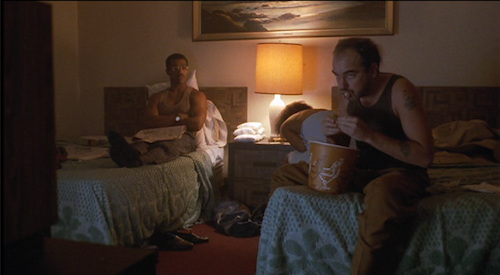
There’s a good surprise (SPOILER) where they set up all this fear about how dangerous Ray and Pluto are and Fantasia, who saved the life of a little kid in the opening, tries to keep things cool when they get pulled over. But then she’s the one who suddenly shoots the cop. The cold simplicity of the staging – a static shot from across the street as the body drops, left laying there on the side of the road after the killers drive away – reminds me of something that could be in BLOOD SIMPLE, FARGO or A SIMPLE PLAN.
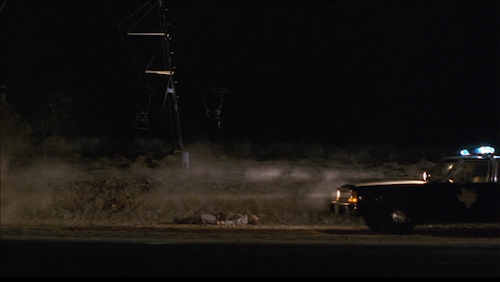
The cinematographer is James L. Carter (SWEET SIXTEEN, LEATHERFACE: TEXAS CHAINSAW MASSACRE III, SPACED INVADERS).
Franklin also uses a minimalistic approach to make an argument between Hurricane and Cheryl Ann more powerful. She’s (correctly) worried that what he’s about to do is too dangerous, and suddenly he snaps at her with all his frustrations: “Just ‘cause I’m not from L.A. don’t mean I can’t watch a god damn house. Okay?” The camera stays still, and there are no cuts, and after 20 seconds pass he touches her hair and tells her he loves her. Doesn’t apologize, just hopes this is enough of a gesture, I guess. Watching the whole thing uninterrupted makes it much more uncomfortable.
According to Williams in a recent interview by Closely Observed Frames, Franklin is also responsible for the simplicity of the story itself:
“What ended up on the screen was a rewrite by Carl Franklin. He simplified the movie and whittled it down to its bare essence a made a very wonderful film noir and storyline. Originally it was more of an epic. It had a whole lot more monologues and dialogue, so there was so much to study.
When I got there, I was given a script with way less to say. I’m good with space and being subtle, so I was able to take all the information from the original script and use it in my body and my tone.”
After more deaths and a shocking revelation or two, all the parties are about to collide at a remote house on a dirt road, so Franklin finally starts placing the camera at crooked angles, putting the world off balance. The final explosion of violence is perfectly ugly, awkward and completely unglamorous. Ray gets shot in the butt cheek and collapses onto a fencepost, then rolls off it. Pluto has been shot but bursts out of the house, ready for his big villain-coming-back-to-life moment, but nobody has to shoot him – he just falls over on his own and drops his bloody knife. It’s practically over before it started.
Hurricane outlives them all, but he’s on the ground when help arrives. The very end is something else (very end spoiler): his five year old secret son who he’d never met is there as he’s dying, and he asks him to “sit with me.” He’s talking to him like someone who’s good with kids, not scaring him, just being nice, while he’s bleeding to death in front of him.
Franklin won Best Director at the Film Independent Spirit Awards (beating Tarantino for RESERVOIR DOGS!). It was also nominated for Best Feature (losing to THE PLAYER), Best Female Lead (losing to Fairuza Balk in GAS FOOD LODGING), Best Original Score (losing to TWIN PEAKS: FIRE WALK WITH ME) and Best Screenplay (losing to THE WATERDANCE). Believe it or not Franklin also won Best New Filmmaker at the MTV Movie Awards (no nominees announced). Sometimes those guys would throw in something more serious than you would think. Best Movie that year was A FEW GOOD MEN and Best Male Performance was Denzel in MALCOLM X, who did not win the Oscar. I told you – it was a weird year.
According to the aforementioned Entertainment Weekly article (published in August), ONE FALSE MOVE experienced “what critics are calling a classic Cinderella story” after Siskel & Ebert’s enthusiastic thumbs up helped it begin “packing art houses in New York, Washington, D.C., Chicago, Seattle, and Los Angeles.” The article said it hadn’t yet turned a profit but had turned Franklin, Williams, Paxton and Thornton into “the hot properties of the moment.” Sure enough, Thornton was in five movies the next year, one of them being TOMBSTONE. But obviously it was writing, directing and starring in SLING BLADE (1995) that turned him into a genuine movie star. He was able to reunite with Epperson to write A FAMILY THING (1996), DON’T LOOK BACK (1996), Sam Raimi’s THE GIFT (2000), CAMOUFLAGE (2001) and JAYNE MANSFIELD’S CAR (2012). On his own, Epperson also did A GUN, A CAR, A BLONDE (1997) and JESSE STONE: NIGHT PASSAGE (2006).
Williams followed this with GREY KNIGHT and the mini-series Armistead Maupin’s Tales of the City. She continues to be prolific, and will next be playing C. Delores Tucker in a movie called AMERICAN ZEALOT.
It took Franklin three years to make his followup, DEVIL IN A BLUE DRESS, but that’s another ‘90s crime classic, soon to enter the Criterion Collection. Like so many directors Franklin just works in TV these days (The Leftovers, Ray Donovan, Mindhunter). In a 2018 Village Voice interview he said he was still being offered thrillers, but wanted to do dramas, and “‘Drama’ is a bad word now.” He also said that “You can also, with the miniseries format, tell more of a story,” and I happen to be excited for his next mini-series project, Manhunt, because it’s based on the great book about the hunt for John Wilkes Boothe after the assassination of Lincoln.
ONE FALSE MOVE is a good little movie. I first saw it on video sometime later in the ‘90s and thought it was pretty good. I like it better now.
*I believe this is a swipe at a specific largely forgotten sequel I’ll be reviewing when I get to the July movies. As far as I know Hollywood was not specifically looking for oversized baby movies at that time. I’m sure if they were there would’ve been a joke about it in THE PLAYER.
RANDOM NOTES:
Thornton and Williams were dating during the movie, got married a few months after, but were divorced by the time it came out.
On Franklin’s commentary track he says of a shot of a car driving: “These pickup shots here were actually shot by Janusz Kaminski, who was a friend of mine when I worked at Roger Corman.”
The bluesy guitar at the beginning is improvised by Peter Haycock of the Climax Blues Band – same guy who played on THELMA & LOUISE. He’s credited as composer alongside band member Derek Holt and classical composer Terry Plumeri (SOMETIMES THEY COME BACK, DEATH WISH V: THE FACE OF DEATH).


























June 6th, 2022 at 7:56 am
I got to see this in the theater on that initial run thanks to DC being a real movie town at the time. I really loved it and recommended it to way too many people who were turned off by the disturbing violence. I had felt it was such a well made film people would be okay with it, but then again I was also really into violent films and didn’t really have a good perspective on what the average movie goer would tolerate.